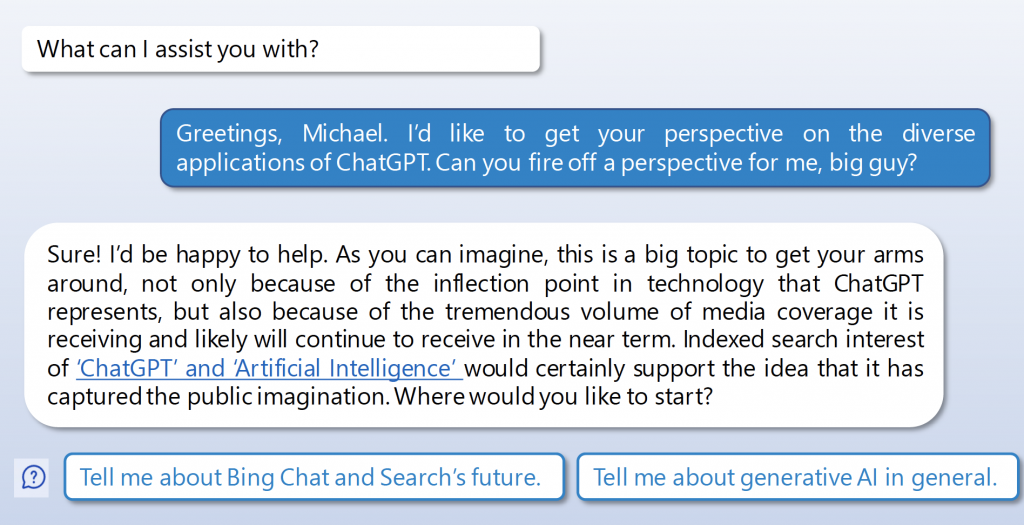Chapter & Verse on Web3 trends and news from the start of 2023.
Search Chatbots: AI-Powered Chat Functionality in Search
This perspective piece is powered by both AI and human intelligence, from Michael Cohen, EVP Performance Media Services, and Donnie Williams, EVP Chief Digital Officer. It is therefore doubly susceptible to mistakes, but we hope there’s enough insight to provide perspective on the industry and help guide conversations with our internal and external stakeholders. Outside of the key takeaways, which we added below for the TLDR crowd, we mimicked the format of Bing Chat so that you can have a better sense of the conversational experience. But, rest assured, the perspective itself is human-generated.

To read the full POV, click the ‘Download PDF’ button to the right.
TLDR:
- Bing has begun incorporating Chat functionality, powered by OpenAI’s ChatGPT, into its Search interface. While currently available only on desktop and to a limited number of users, the expectation is that this feature will roll out more broadly in the short term. Google appears to be accelerating the launch of its own Chat product, Bard, though plans for launch are less clear.
- Given ChatGPT’s meteoric growth and initial adoption (100MM users in its first two months), Bing Chat’s release is intended to capture a significant share of Search, which it can extend by leveraging Chat in Microsoft enterprise products.
- While Bing is expected to iterate rapidly on the Bing Chat user experience, there appears to be ample opportunity for linking to publisher websites, both organically and for paid ads. The expectation is that these links will look, feel, and perform like contextual or native ads and that ad performance will improve over time as Bing (and Google) optimize user experience and identify high-value, high-intent traffic through chat-based conversation.
- Opportunities for Search advertising, including how to build and run campaigns, have not been made public — yet.
- One potential implication of Search Chat ads for the ad industry is that contextual display performance could suffer, as search engines will better be able to identify and monetize the best-performing traffic inside their Chat environment.
- Initial feedback on and media coverage of Bing Chat has been inflammatory, inducing Bing to implement controls that limit the types of topics users can explore and the length of chat. This is most likely a temporary situation that Bing will address over time.
- While Bing Chat, and Search Chat in general, are likely to point to a different paradigm for search activity and the search ads industry, we do not anticipate a meaningful change in the short to medium term.
To read the full POV, click ‘Download PDF’ below.



